After 27 years of living and working in New Jersey, Michael Cusack decided it was time to move “home” to the wilds of the remote Co Mayo countryside and a small village with no shops or street lights and just one pub.
Home, to Michael, was a place that had never really been his home, but a place he had come to love thanks to childhood family holidays at the birthplace of both of his parents on the shores of Clew Bay.
A well-traveled man with a keen interest in folk history, the art of telling a story, and the beauty of one of Ireland’s least-known unspoiled treasures, Michael has since written a book about his love for Croagh Patrick and the 142 named islands of Clew Bay.
Many visitors to Ireland are taken aback by the stunning beauty of the Ring of Kerry and Connemara, but Michael believes they are missing out if they don’t travel an hour or two north of Galway to check out the truly unspoiled paradise on the western shores of Co Mayo.
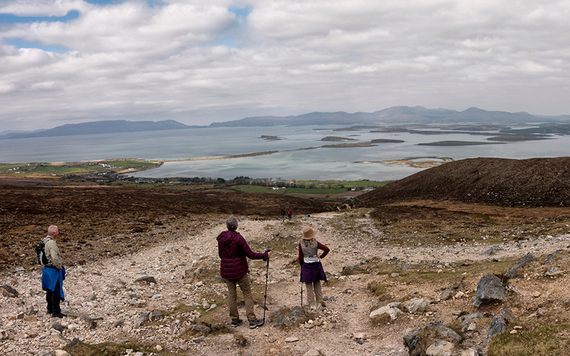
Croagh Patrick.
Four years on from his move to the tiny village of Lecanvey, near Westport, Michael is thrilled with his new life. He is able to combine work as a business consultant for companies in the US with a treasured new role as a tour guide for intrepid visitors who want to walk, climb, or hire a boat in this stunning part of the West of Ireland.
After bringing up two sons in New Jersey, the former international cyclist decided to move back to Ireland in October 2014. A true adventurer, he had also lived in Austria and Saudia Arabia before settling down in the US.
People thought he was crazy, trying to set up a business as a consultant in such a remote area, but he always had a passion for this part of Mayo and had always wanted to write a book about the islands and surrounding area.
“Basically, I went from white picket fence suburban America with all of its amenities to a village that had no shops, no street lights, and just a pub visited by a few local farmers during the long winter months,” he told IrishCentral.
“It was a sea change from the hustle of New Jersey and the high-pressure life of a corporate consultant. I actually got remote work with an American company. It was such a change to be able to walk along the wild western seashore before returning to my one-room chalet to take a call with clients working in Manhattan!”
Sometimes his clients had no idea the troubles he went to. The phone signal was so bad in his village in 2014 that he would have to drive at speed to the nearest high point, in order to be heard at business meetings taking place 3,000 miles away. But he loves life in his one-bedroom chalet as he looks out over the bay.
“The silence at night in Lecanvey was often broken by incredible winds sweeping off the Atlantic Ocean. Sometimes I thought the entire roof was lifting, the gusts were so strong. New Jersey virtually never has any wind, so it was a huge contrast!”
Michael feels the area is in his blood. He first climbed Croagh Patrick at six years of age and his grandfather, Peter Hopkins, was one of the last boat pilots of Clew Bay. His great-great-grandfather was the Admiralty Pilot for the west coast of Ireland. Five years on, he loves the place.
“Another big difference for me was the fact that everyone in the West of Ireland said hello or waved as I drove by - this is unheard of in NJ. There was also music in almost every pub in Westport - another very big social difference, as pubs in New Jersey are usually for hard drinkers and very rarely have any music. People tend to drink only in their homes,” he says.
“If you are willing to put up with rain or the wind, I have to say that the quality of life in the West of Ireland is better in so many ways - not least because the people are genuinely friendly.”
Michael realized a dream when he launched a book entitled “Croagh Patrick and The Islands of Clew Bay.” It’s a look at the legends and folklore of this beautiful place, but also a social history of an area that was decimated by the Great Famine and waves of emigration to North America.
“Clew Bay has 142 islands and it’s the only part of Ireland that has this particular type of drumlins. We have boat cruises that go out from Newport and Westport. It really is one of the most beautiful places in the world I think, when you can look out at Croagh Patrick to the south or the Nephin Mountains to the north,” he says.
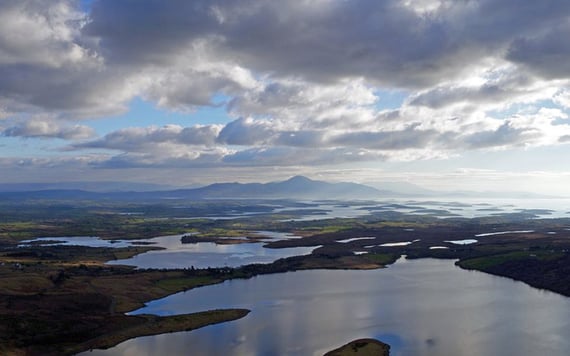
Clew Bay.
“If you climb Croagh Patrick on a clear day, there really are no better views anywhere in the world. And now I am lucky enough to be able to guide people who want to climb ‘The Reek,’ as everyone here refers to the mountain, or to bring them on boat or cycling tours.”
His book explores the devastating impact depopulation had on the islands, with painstaking research into census figures going back to 1841.
He also loved talking to local people in the area, researching the folk tales about “Pirate Queen” Grace O’Malley, who operated out of Clew Bay in the 16th century. Before the British colonizers had fully mapped out the west coast of Ireland, she used to torment ship captains up and down the coast.
Grace, who spoke no English, famously used Latin when she traveled to London to converse with Queen Elizabeth and refused to bow down to the British monarch, as she did not recognize her as the Queen of Ireland.
His book also contains much more modern stories, such as the tale of how John Lennon of The Beatles purchased the island of Dornish in the late 1960s. His partner, Yoko Ono, was swooped upon by nesting terns on her first visit to the island and swore she would never return. Instead, they allowed a group of hippies to set up a commune on the island.
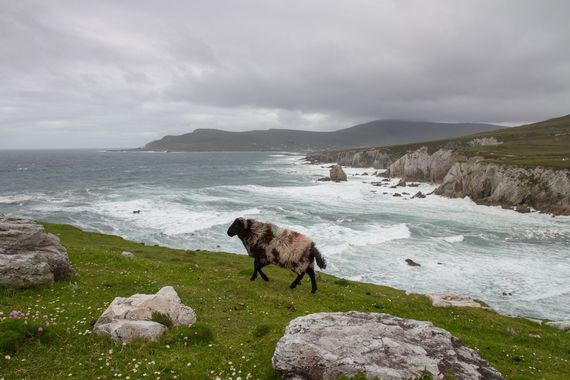
Achill Island, County Mayo.
The book chronicles the sad decline in the population of most of the Clew Bay islands, many of which have no inhabitants now.
“There is an aura of sadness from the Famine in the West of Ireland in particular. Even when you drive around today, you can see the furrows of the potato fields. I think you sense this whole sadness at losing people from the locals, especially when you go as far west as Louisburg,” he says.
“So many people went away to America and never came back. There are quite a number of deserted villages. One area, which is at the end of a road, is called the Lost Strand. It’s a great example of a famine village which has been deserted.”
And yet Michael is delighted to have left the hustle and bustle of New Jersey for one of the most isolated areas in the West of Ireland.
“It’s not hard to be inspired by this part of the world,” he says.
“It is one of nature’s great spectacles. It only takes a few minutes of climbing up Croagh Patrick to see why. The swarm of drumlins across Clew Bay is unlike anything else in Western Europe.”
You can learn more about Cusack's book "Croagh Patrick and the Islands of Clew Bay" on his website here.
*Ciaran Tierney won the 2018 Irish Current Affairs and Politics Blog of the Year award. Find him on Facebook, Twitter, or his website. A former newspaper journalist, he is seeking new opportunities in the digital world.
*Originally published in August 2019. Last updated in September 2023.
This article was submitted to the IrishCentral contributors network by a member of the global Irish community. To become an IrishCentral contributor click here.
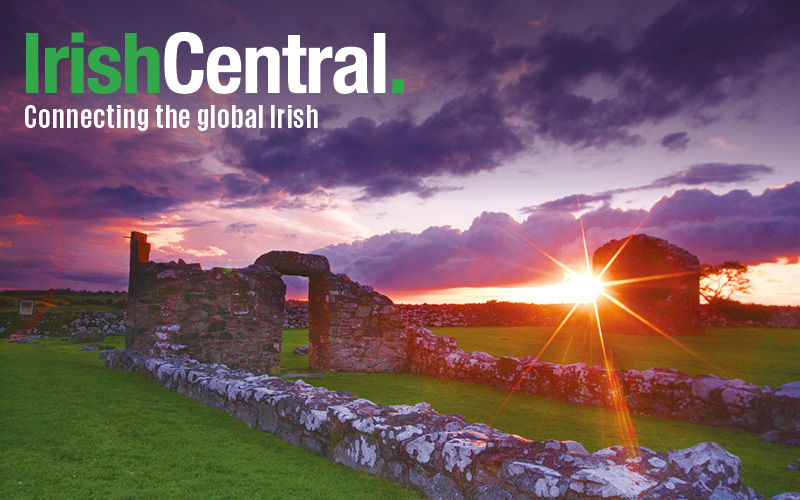


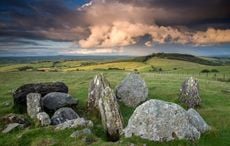
Comments